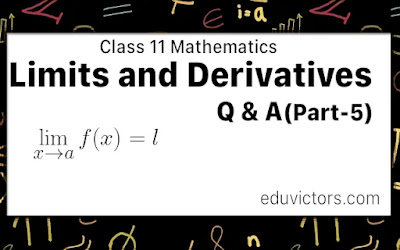CBSE Class 11 - Mathematics - Limits and Derivatives Part-5
In the previous blog post Limits and derivatives Part-4, we learned about the trigonometric limits. Let us solve other problems related to Limits
Q1: Evaluate $\lim_{x\rightarrow 0} (\frac{e^{3x}- 1}{x})$
Answer:
$\lim_{x\rightarrow 0} (\frac{e^{3x}- 1}{x})$
$\because x \rightarrow 0 \Rightarrow 3x \rightarrow 0$
= $\lim_{3x\rightarrow 0}\left [ (\frac{e^{3x}- 1}{3x})\times 3 \right ]$
Let y = 3x
= $3 \times \lim_{y\rightarrow 0} (\frac{e^y- 1}{y})$
= $3 \times 1$
= 3
Q2: Evaluate $\lim_{x\rightarrow \frac{\pi}{2}} \frac{\tan 2x}{x - \frac{\pi}{2}}$
Answer:
$\lim_{x\rightarrow \frac{\pi}{2}} \frac{\tan 2x}{x - \frac{\pi}{2}}$
Put x = $\frac{\pi}{2} + h$, since $x\rightarrow \frac{\pi}{2}, h \rightarrow 0$
= $\lim_{h\rightarrow 0} \frac{\tan 2({\frac{\pi}{2}+h)}}{\frac{\pi}{2} + h - \frac{\pi}{2}}$
= $\lim_{h\rightarrow 0} \frac{\tan{(\pi + 2h)}}{h}$
= $\lim_{h\rightarrow 0} \frac{\tan{2h}}{h}$
= $\lim_{h\rightarrow 0} (\frac{\sin{2h}}{2h})\frac{2}{\cos 2h} = \frac{2}{1} = 2$
Q3: Let $f(x) = \begin{Bmatrix} x^2-1,& x\leq 1 \\ -x^2-1 & x>1 \end{Bmatrix}$
Find $\lim_{x\rightarrow 1} f(x)$
Answer: We have
R.H.L.
$\lim_{x\rightarrow 1^+} f(x) = \lim_{h \rightarrow 0}f(1 + h)$
= $\lim_{h \rightarrow 0}\left \{ -(1+h)^2 -1 \right \}$
= $\lim_{h \rightarrow 0}\left \{ -2 -h^2 -2h \right \} = -2$
LHL
$\lim_{x\rightarrow 1^-} f(x) = \lim_{h \rightarrow 0}f(1 - h)$
= $\lim_{h \rightarrow 0}\left \{ -(1-h)^2 -1 \right \}$
= $\lim_{h \rightarrow 0}\left \{ 1+h^2 -2h -1 \right \}$
= $\lim_{h \rightarrow 0}\left \{h^2 -2h \right \}$
= 0
$\therefore \lim_{x\rightarrow 1^+} f(x) \neq \lim_{x\rightarrow 1^-} f(x)$
Hence, $\lim_{x\rightarrow 1} f(x)$ does not exist.
Q4: Fin 'n' if $\lim_{x\rightarrow 2} \frac{x^n - 2^n}{x - 2} = 80, n\epsilon N$
Answer:
$\lim_{x\rightarrow 2} \frac{x^n - 2^n}{x - 2} = 80$
$\Rightarrow x(2)^{2n-1} = 5(2)^{5-1}$
On comparing we get n = 5
In the next post, we shall discuss about derivatives or differntiation.
👉See Also:
Ch5: Complex Numbers (Part 1) - Solved Problems
Ch 13 Limits and Derivatives (Q & A ) Part -1
Ch 13 Limits and Derivatives (Q & A) Part - 2
Ch 13 Limits and Derivatives (Q & A) Part - 3
Ch 13 Limits and Derivatives (Q & A) Part- 4
Ch 13 Limits and Derivatives (Q & A ) Part -1
Ch 13 Limits and Derivatives (Q & A) Part - 2
Ch 13 Limits and Derivatives (Q & A) Part - 3
Ch 13 Limits and Derivatives (Q & A) Part- 4

No comments:
Post a Comment
We love to hear your thoughts about this post!
Note: only a member of this blog may post a comment.